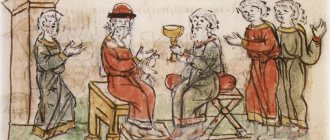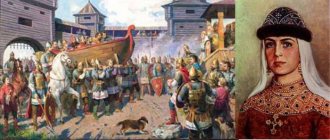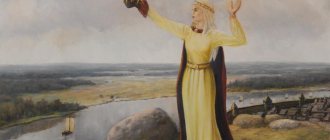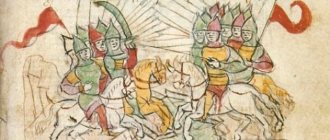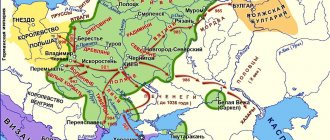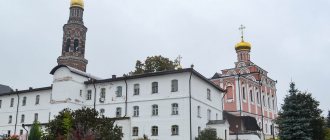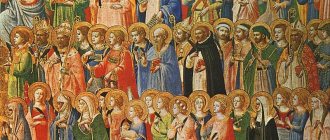Epiphany Cathedral in Yelokhov
On July 24 and 28, the Holy Church celebrates the memory of the Holy Equal-to-the-Apostles Grand Duchess Olga and Grand Duke Vladimir.
The Russian land owes its conversion to Christianity to these two saints. Princess Olga is the first Russian saint. She lived in the 9th–10th centuries. and came from those places that later became the Pskov region.
Her fate was amazing! A simple girl, she was engaged in transportation across the Velikaya River. One day, in the northern forests, where Olga’s village was located, Kiev Prince Igor was hunting. He needed to move to the other side of the river - and he was amazed by the beautiful, noble appearance of the carrier.
And later, when the time came for Igor to get married, he found Olga and took him as his wife. So Olga became a Russian princess.
The son of Igor and Olga, Svyatoslav, was still young when Igor was killed in battle. Instead, Olga began to rule Russia.
At that time, the Slavs worshiped pagan gods. Following pagan laws, Olga cruelly took revenge on Igor’s enemies for his death.
But her conscience told her that revenge was uncalled for.
From Christians who had already appeared in Kyiv, Olga heard that
God commands to forgive enemies and do good to them. She felt the truth of these gospel words and decided to accept Christianity.
For baptism, the princess went to Byzantium. Here she was greeted with great honor. Olga was baptized by the patriarch himself, and the emperor was the godfather.
Returning to Kyiv, Olga immediately began building Christian churches. Tradition says that she built churches in Kyiv, Vitebsk, and Pskov. A miracle was associated with the construction of the church in Pskov. The city of Pskov itself did not exist then.
While in her native place, on the Velikaya River, Olga once saw three bright rays illuminating a place on a steep bank. The princess erected a cross there, founded a temple in the name of the Holy Trinity and predicted that a large city would grow here. Thus, Saint Olga laid the foundation of Pskov.
Olga was a wise ruler. About her, the herald of Christianity in Rus', the chronicle says that she was the first among the Russians to enter the Kingdom of Heaven.
Olga’s grandson, Grand Duke Vladimir, had the opportunity to baptize Rus'.
At first, Vladimir was a pagan, like his father, Svyatoslav, who did not want to accept Christianity.
But Saint Olga’s childhood education and prayers for him were not in vain. Intense work was going on in the prince’s soul, and over time he became more and more inclined towards Christian truth.
The decisive thing for Vladimir was a conversation with a Greek monk who spoke about life after death and about God’s judgment on people.
Vladimir sent ambassadors to different countries to decide which faith to accept instead of paganism.
The ambassadors who traveled to Constantinople and attended a service in the Church of Sophia the Wisdom of God were amazed by what they saw. “We didn’t know whether we were in heaven or on earth,” they said, being delighted with the divine beauty and significance of the service.
And Vladimir decided to accept Christianity from the Orthodox Greeks.
He was baptized, however, not in Byzantium, but in the Greek city of Korsun -
present Chersonese.
In 988, Vladimir gathered all the people of Kiev on the banks of the Dnieper. The great work of the baptism of Rus' began.
People, many with children in their arms, entered the water; priests on the shore read baptismal prayers, and everyone was given Christian names.
The spiritual birth of a new Russian man took place in the waters of the Dnieper.
After his conversion, Vladimir became completely different: for his kindness, the people nicknamed him “Red Sun”.
He did good to everyone, and made Kyiv the center of Christian faith and culture.
Here you can hear the Greatness of the Equal to the Apostles Prince Vladimir travel chant and an excerpt from his life. Choir conducted by Boris Tevlin.
Origin of Olga: fiction and reality
There are many versions of the origin of Princess Olga. The exact date of her birth is unclear, we will stick to the official version - 920.
It is also unknown about her parents. The earliest historical sources - “The Tale of Bygone Years” and “The Book of Degrees” (XVI century) - say that Olga was from a noble family of Varangians who settled in the vicinity of Pskov (the village of Vybuty).
A later historical document, “Typographical Chronicle” (XV century), tells that the girl was the daughter of Prophetic Oleg, the teacher of her future husband, Prince Igor.
Some historians are confident in the noble Slavic origin of the future ruler, who initially bore the name of Beauty. Others see her Bulgarian roots, allegedly Olga was the daughter of the pagan prince Vladimir Rasate.
The road to glory: Olga's lessons to our contemporaries
By analyzing the meager and varied information from historical documents, certain conclusions can be drawn. This woman was not a “vengeful monster.” Her horrific actions at the beginning of her reign were dictated solely by the traditions of the time and the intensity of the widow’s grief.
Although it cannot be written off that only a very strong-willed woman can do something like this.
Princess Olga was undoubtedly a great woman, and rose to the heights of power thanks to her analytical mind and wisdom. Not being afraid of change and having prepared a reliable rear of loyal comrades, the princess was able to avoid a split in the state - and did a lot for its prosperity.
At the same time, the woman never betrayed her own principles and did not allow her own freedom to be infringed.
Popular message topics
- Arctic fox
The arctic fox belongs to the family of predatory mammals, and even canines. He is the only representative of his kind. To many he may resemble a fox. Its body is only seventy-five centimeters, but its legs are very short. - Works of Belyaev
On March 4, 1884, Russian writer Alexander Romanovich Belyaev was born in the city of Smolensk. The family of the Orthodox priest Roman Petrovich and Natalya Fedorovna already had two children: Nina and Vasily. - Storing information
Information accumulated by a person over time is very important, because it often needs to be used. That’s why it’s better to store it somewhere. If pieces of information get lost somewhere, then things will be bad in the future.
Death of Igor: the terrible revenge of Princess Olga
Princess Olga's first act as a ruler, immortalized in the chronicles, is terrifying. The Drevlyans, who did not want to pay tribute, captured and literally tore Igor’s flesh, tying him to two bent young oak trees.
By the way, such an execution in those days was considered “privileged.”
At one point, Olga became a widow, the mother of a 3-year-old heir - and in fact the ruler of the state.
Princess Olga meets the body of Prince Igor. Sketch, Vasily Ivanovich Surikov
The woman’s extraordinary intelligence manifested itself here too; she immediately surrounded herself with trusted people. Among them was the governor Sveneld, who enjoyed authority in the princely squad. The army unquestioningly obeyed the princess, and this was necessary for her revenge for her dead husband.
20 ambassadors of the Drevlyans, who arrived to woo Olga for their ruler, were first carried with honor in the boat in their arms, and then with her - and buried alive. The woman's ardent hatred was obvious.
Leaning over the pit, Olga asked the unfortunate people: “Is honor good for you?”
This did not end there, and the princess asked for more noble matchmakers. Having heated the bathhouse for them, the princess ordered them to be burned. After such daring actions, Olga was not afraid of revenge against herself, and went to the lands of the Drevlyans to perform a funeral feast at the grave of her deceased husband. Having drunk 5 thousand enemy soldiers during a pagan ritual, the princess ordered them all to be killed.
Then things got worse, and the vengeful widow laid siege to the Drevlyan capital Iskorosten. Having waited all summer for the city to be handed over, and having lost patience, Olga once again resorted to cunning. Having asked for a “light” tribute - 3 sparrows from each house - the princess ordered burning branches to be tied to the birds’ paws. The birds flew to their nests - and as a result, they burned the entire city.
At first it will seem that such cruelty speaks of a woman’s inadequacy, even taking into account the loss of her beloved husband. However, it should be understood that in those days, the more violent the revenge, the more respected the new ruler was.
With her cunning and cruel act, Olga established her power in the army and achieved the respect of the people, refusing a new marriage.
Princess Olga's legacy
Before her death, the princess, complaining of her illnesses, was able to draw her son’s attention to the internal governance of the principality, which was besieged by the Pechenegs. Svyatoslav, who had just returned from the Bulgarian military campaign, postponed a new campaign to Pereyaslavets.
Princess Olga died at 80, leaving her son a strong country and a powerful army. The woman received communion from her priest Gregory and forbade holding a pagan funeral feast. The funeral took place according to the Orthodox rite of burial in the ground.
Already Olga’s grandson, Prince Vladimir, transferred her relics to the new Kyiv Church of the Holy Mother of God.
According to the words recorded by monk Jacob, an eyewitness to those events, the woman’s body remained incorrupt.
History does not provide us with clear facts confirming the special holiness of a great woman, with the exception of her incredible devotion to her husband. However, Princess Olga was revered by the people, and various miracles were attributed to her relics.
In 1957, Olga was named equal to the apostles; her life of holiness was equal to the life of the apostles.
Now Saint Olga is revered as the patroness of widows and protector of newly converted Christians.
Wise ruler of Kievan Rus
The threat of the Khazars from the south and the Varangians from the north required the strengthening of princely power. Olga, having traveled even to her distant lands, divided the lands into plots, established a clear procedure for collecting tribute and put her people in charge, thereby preventing the indignation of the people.
She was prompted to this decision by the experience of Igor, whose squads robbed on the principle of “as much as they could carry.”
It was for her ability to manage the state and prevent problems that Princess Olga was popularly called the wise one.
Although his son Svyatoslav was considered the official ruler, Princess Olga herself was in charge of the actual governance of Russia. Svyatoslav followed in his father’s footsteps and was engaged exclusively in military activities.
In foreign policy, Princess Olga faced a choice between the Khazars and the Varangians. However, the wise woman chose her own path and turned towards Constantinople (Constantinople). The Greek direction of foreign policy aspirations was beneficial to Kievan Rus: trade developed, and people exchanged cultural values.
I. Mashkov “Princess Olga enters the Church of St. Sophia”
Having stayed in Constantinople for about 2 years, the Russian princess was most struck by the rich decoration of Byzantine churches and the luxury of stone buildings. Upon returning to her homeland, Olga will begin the widespread construction of palaces and churches made of stone, including in the Novgorod and Pskov possessions.
She was the first to build a city palace in Kyiv and her own country house.
Video: Princess Olga
The secret of Princess Olga's childhood is revealed a little by her first appearance on the stage of historical events at the time of her acquaintance with Prince Igor.
The most beautiful legend about this meeting is described in the Book of Degrees:
Prince Igor, crossing the river, saw a beautiful girl in the boatman. However, his advances were immediately stopped.
According to the legends, Olga replied: “Even though I am young and ignorant, and alone here, but know: it is better for me to throw myself into the river than to endure reproach.”
From this story we can conclude that, firstly, the future princess was very beautiful. Her charms were captured by some historians and painters: a young beauty with a graceful figure, cornflower blue eyes, dimples on her cheeks and a thick braid of straw hair. The scientists also created a beautiful image, recreating the portrait of the princess based on her relics.
The second thing that should be noted is the complete absence of frivolity and the bright mind of the girl, who was only 10-13 years old at the time of her meeting with Igor.
In addition, some sources indicate that the future princess knew literacy and several languages, which clearly does not correspond to her peasant roots.
Indirectly confirms Olga’s noble origins and the fact that the Rurikovichs wanted to strengthen their power, and they did not need a rootless marriage - but Igor had a wide choice. Prince Oleg had been looking for a bride for his mentor for a long time, but not one of them displaced the image of the obstinate Olga from Igor’s thoughts.
